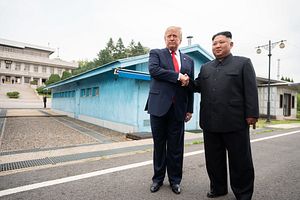It has now been more than five days since the North Korean Ministry of Foreign Affairs first suggested that Trump had agreed to suspend the upcoming late-summer U.S.-South Korea military exercises during his meeting with Kim Jong Un on June 30. I discussed the unsurprising North Korean statement and what it suggested for the resumption of working-level talks between Washington and Pyongyang at The Diplomat last week.
Nearly one week on, there’s simply no clarity about the core ambiguity at the center of this dispute: did the U.S. president give Kim an assurance of the sort that the North Korean Foreign Ministry insinuated?
“The suspension of joint military exercises is what President Trump, commander-in-chief of the U.S., personally committed to at the DPRK-U.S. summit talks in Singapore under the eyes of the whole world and reaffirmed at the DPRK-U.S. summit meeting in Panmunjom, where our Foreign Minister and the U.S. Secretary of State were also present,” the Foreign Ministry spokesperson noted.
Neither Trump nor U.S. Secretary of State Mike Pompeo have addressed the issue head-on. Trump, when asked about progress with North Korea, simply reiterated that he was in no rush, but did not clarify if he and Kim had talked about exercises. Pompeo confirmed a core part of the North Korean account in his remarks immediately following the third Trump-Kim meeting: “I’ll leave the President to talk about the substance of the conversation since it was, from the American side, just he and I in the meeting.”
But what remains unsaid on the American side is anything specific concerning the exercises. It’s believable that Trump may have addressed the topic. One of the outcomes of last year’s U.S.-North Korea Singapore summit meeting was the cancellation of the 2018 Ulchi-Freedom Guardian exercises, which had been scheduled for August.
“Under the circumstances that we’re negotiating a very comprehensive complete deal, I think it’s inappropriate to have war games… It is something that [North Korea] very much appreciated,” Trump said at the time. It’s possible Kim might have asked him if he stood by that broader comment on the propriety of “war games” while trying to proceed with negotiations. Either way, the record on the June 30 meeting remains woefully under-documented on the American side.
This weekend, Choi Jong-kun, the South Korean presidential office’s secretary for peace planning, told an audience that the exercise — codenamed Dong Maeng 19-2 (or “Alliance”) — should go on. “The nature of the exercise is not offensive … and is for strengthening the alliance,” Choi said. “As far as I know, President Trump did not promise the cancellation of this upcoming military exercise,” added Choi, according to Reuters. “If he had done that … we would have been consulted and organized it and used it very strategically.”
While Choi’s comments were unsurprising and in line with the South Korean government’s broader policy toward the continuation of U.S.-South Korea military activities since early 2018, his remark that South Korea would have been consulted unfortunately doesn’t ring true. Trump’s decision in Singapore to call off Ulchi-Freedom Guardian 2018 was made without bilateral consultations within the alliance. Beyond that, U.S. Forces Korea even noted at the time that it hadn’t received prior notice of the cancellation of the exercises.
The answer to the question about what exactly Trump promised Kim on June 30 matters deeply. Last week’s North Korean Foreign Ministry statement was notable for positioning Trump as being on the cusp of breaking an assurance that had been given to the North Korean side. In recent months, North Korean state media and official statements have mostly praised the U.S. president’s personal relationship with Kim, even though other U.S. officials have been slammed. If the exercises proceed and North Korea chooses to interpret that as a “violation” of an American commitment, the path toward the resumption of working-level talks may end before the talks can even begin.
Prospects for diplomacy with Pyongyang would only worsen from there.
































